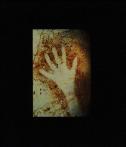
Imagine that the Earth had not one, but four suns. Imagine that these suns were so arranged that at any given time at least one of them was in the sky, so that mankind lived its entire life in brightness. The deepest darkness men would ever have known would be the greyish twilight of an overcast day. There would be no night and day, no stars (since the stars would never be visible), no real concept of darkness at all (except perhaps that tiny blackness that rests behind each man's eyelids).
Then suppose that one day a man from such a world stumbled upon a cave and discovered what true darkness was. How would he react to this? How would he explain it to his fellow men? Explaining a greater presence (of light, for instance) is hard enough, but how does one describe a greater absence; how does one explain, in fact, the complete inability to see (for men who have lived their entire life in light, this would be like not being able to breathe). And even if they believed him somehow, even if they came with him to the cave, would it not frighten them, the emptiness. Would they, who would have no night vision at all, not panic at being thus suddenly blinded? Would they not turn against him then, shut him away in his cave like Merlin, blocking the way out with a great stone, making, ironically, his darkness complete?
If there were no darkness, how long could we live in the glare of the truth?




7 comments:
Hmm .. onethinks similar Platonic themes were explored by Asimov in 'Nightfall', his short story about a planet orbiting multiple suns, which was itself inspired by Emerson's observation:
"If the stars should appear one night in a thousand years, how would men believe and adore and preserve for many generations the remembrance of the city of God!"
Ol' Isaac's story was kinda dystopian too, but he thankfully spared us the Merlin-locked-up-in-cave routine ;-).
Great blog BTW.
Asimov again! Been reading Nightfall eh?
The One / Veena: You're not going to believe me, but I honestly didn't think about the connection to Asimov till I saw One's comment this morning (further evidence, btw, that I'm growing senile).
The inspiration (or whatever) for this piece was this Bertolucci film called Il Conformista (The Conformist) that I watched yesterday which has this section on Plato's cave. And I just thought it would be interesting to invert the idea - basically imagine a world where there was only light and no real darkness.
Yes, obviously "Nightfall", which is one of his few early stories that is well written apart from the imagination part.
Another parallel - H.G. Wells, The Country of the Blind. Would that apply to the only man to know darkness?
J.A.P.
Great article! Thanks.
Thanks for interesting article.
Excellent website. Good work. Very useful. I will bookmark!
Post a Comment